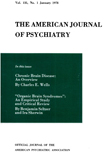REGRESSIVE EMOTIONAL BEHAVIOR IN COLLEGE STUDENTS
Abstract
To conclude, regression is a necessary step in maturation. It is commonly seen in college students and perhaps to a greater extent in them than in young people who go directly to work from high school. Ideally, it should be purposeful and contributory to the progress of the race. Necessarily it will result in unevenness of behavior, in excesses and sometimes in pathological by-products.
The alienation of generations from each other which exists even within peer groups, increased living pressures and competition in the college environment are considered factors that increase frequency and duration of regression. Shifting parental roles undoubtedly complicate the identity formation of college students. The pendulum swing away from authoritarianism to permissiveness leaves the college student with a feeling of emptiness and confusion. Without religion, without parental guidance to fill the void, with a faculty too remote to help, the college student often seeks refuge in regression.
We have described regression as healthy in some instances and pathological in others. When it results from fear, repression or guilt it may cause fixation at a more primitive level of adjustment and consequent lifelong neurosis or psychosis. When it represents a forward thrust, alternating with periods of consolidation or temporary regression, it serves the advance of civilization.
If one sees the college student in the psychiatric office, one sees and hears an aspect of student life that is not visible to anyone else, or at least not in the same way. Yet the view of the educator, historian and anthropologist—of everyone, including the student himself—reflects an image that contributes to a composite whole. For me, regressive aspects of behavior in late adolescence appear to be a useful modus operandi of understanding the college student who so lately has come by the outward manifestations of maturity and so quickly and easily scurries back to the security of an earlier phase. Whether it is our society, our nuclear age or our pseudo-sophistication that causes this and to what extent this is a universal phenomenon of adolescence in all ages—these are questions that we should all ask but for which we should not seek simplified answers.
Access content
To read the fulltext, please use one of the options below to sign in or purchase access.- Personal login
- Institutional Login
- Sign in via OpenAthens
- Register for access
-
Please login/register if you wish to pair your device and check access availability.
Not a subscriber?
PsychiatryOnline subscription options offer access to the DSM-5 library, books, journals, CME, and patient resources. This all-in-one virtual library provides psychiatrists and mental health professionals with key resources for diagnosis, treatment, research, and professional development.
Need more help? PsychiatryOnline Customer Service may be reached by emailing [email protected] or by calling 800-368-5777 (in the U.S.) or 703-907-7322 (outside the U.S.).



